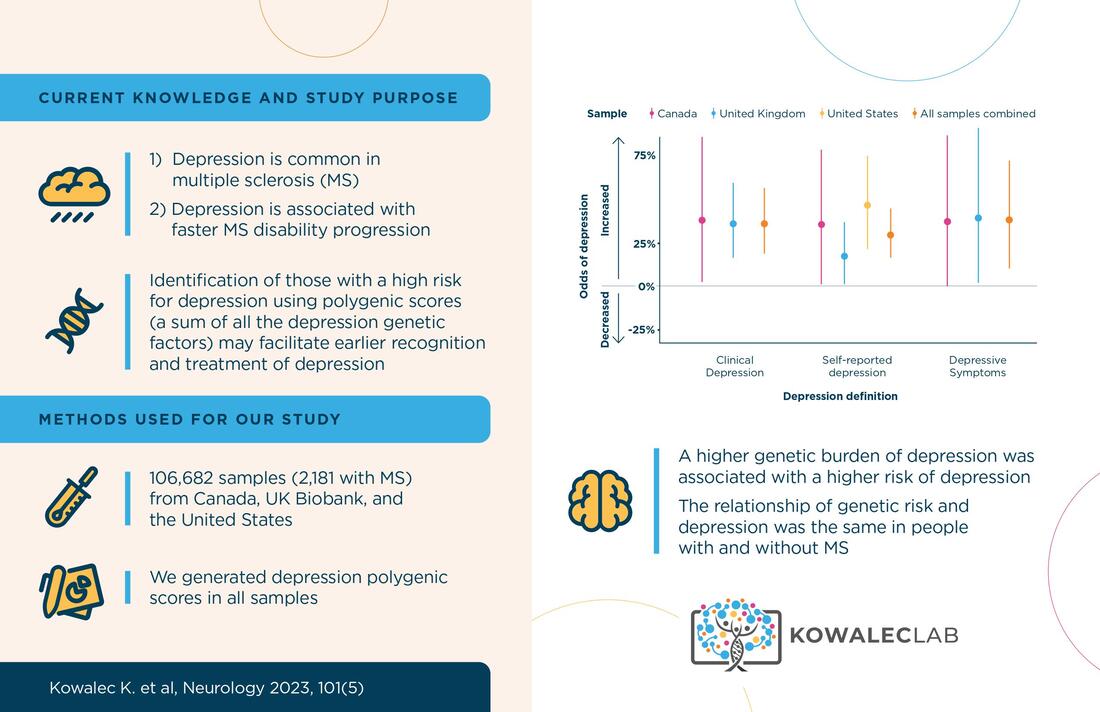Current Projects
Theme 1: Epidemiology and genomics of poor outcomes in schizophrenia
Schizophrenia (SCZ) is one of the top 15 leading causes of disability worldwide, with the average number of life years lost ~30 years. Those with SCZ are at 15-25 times higher risk for suicide, compared to the general population. It is currently estimated that ~200,000 Canadians have SCZ. In 2004, the direct healthcare and non-healthcare costs related to SCZ in Canada were estimated at >$2B, and when considering additional losses, resulted in a total cost estimate of $6.85B. Features associated with poor outcomes in SCZ include childhood adversities (e.g. neglect), family history of psychiatric disorders, and SCZ genomic burden (the weighted sum of the number of SCZ genetic risk variants within each individual). There are currently no means of predicting, at first clinical presentation, who will experience a poor outcome in SCZ. Our overall goal is early detection of those at high risk for poor outcomes in SCZ, thereby triggering logical and effective interventions to mitigate the personal, social, and societal costs associated with severe SCZ. Our overarching translational goal is to develop valid and clinically useful models that predict crucial clinical outcomes for psychiatry and to implement the predictive models on a provincial and national scale.
Projects:
Schizophrenia (SCZ) is one of the top 15 leading causes of disability worldwide, with the average number of life years lost ~30 years. Those with SCZ are at 15-25 times higher risk for suicide, compared to the general population. It is currently estimated that ~200,000 Canadians have SCZ. In 2004, the direct healthcare and non-healthcare costs related to SCZ in Canada were estimated at >$2B, and when considering additional losses, resulted in a total cost estimate of $6.85B. Features associated with poor outcomes in SCZ include childhood adversities (e.g. neglect), family history of psychiatric disorders, and SCZ genomic burden (the weighted sum of the number of SCZ genetic risk variants within each individual). There are currently no means of predicting, at first clinical presentation, who will experience a poor outcome in SCZ. Our overall goal is early detection of those at high risk for poor outcomes in SCZ, thereby triggering logical and effective interventions to mitigate the personal, social, and societal costs associated with severe SCZ. Our overarching translational goal is to develop valid and clinically useful models that predict crucial clinical outcomes for psychiatry and to implement the predictive models on a provincial and national scale.
Projects:
- Investigating the association between accelerated DNA methylation age and mortality in SCZ. This work is published in Translational Psychiatry.
- Using population-based Swedish National register data and extensive genomic data to examine treatment resistance in schizophrenia (published in Molecular Psychiatry).
- Investigating the role of genetic variation in association with specific and all cause mortality in schizophrenia. This work is published in Translation Psychiatry.
Theme 2: Epidemiology and genomics of poor outcomes in multiple sclerosis (MS) and other chronic immunoinflammatory diseases
The prevention of poor outcomes, such as serious adverse drug reactions associated with MS therapies or the development of psychiatric disorders, is essential for those with MS and other chronic immunoinflammatory diseases. Currently, there are few clinically useful predictors of poor outcomes in MS. Variability in the genes that underscore drug biotransformation may be the key to identifying and predicting who is at greatest risk of serious adverse drug reactions and likewise, investigating the genes that underlie polygenic traits like psychiatric disorders, may also be important in investigating those at greatest risk for a psychiatric disorder. Findings from our cutting-edge work (published in Nature Genetics, Neurology, BMJ Open, Expert Opinion in Drug Safety, and MS and Related Disorders) could improve outcomes in MS and contribute to the future development of precision medicine approaches to MS and other autoimmune diseases.
Projects:
The prevention of poor outcomes, such as serious adverse drug reactions associated with MS therapies or the development of psychiatric disorders, is essential for those with MS and other chronic immunoinflammatory diseases. Currently, there are few clinically useful predictors of poor outcomes in MS. Variability in the genes that underscore drug biotransformation may be the key to identifying and predicting who is at greatest risk of serious adverse drug reactions and likewise, investigating the genes that underlie polygenic traits like psychiatric disorders, may also be important in investigating those at greatest risk for a psychiatric disorder. Findings from our cutting-edge work (published in Nature Genetics, Neurology, BMJ Open, Expert Opinion in Drug Safety, and MS and Related Disorders) could improve outcomes in MS and contribute to the future development of precision medicine approaches to MS and other autoimmune diseases.
Projects:
- Understanding psychiatric comorbidity in chronic immunoinflammatory diseases using genomics:
- We published work modelling longitudinal depressive symptoms in IMID to understand their evolution and identify any associated factors (including polygenic risk scores), with the overall goal of identifying those at highest risk of higher depressive symptom burden. This work is published in General Hospital Psychiatry.
- We then followed this with an assessment of depression polygenicity in multiple sclerosis and this work is published in Neurology [see infographic below] and an assessment of anxiety polygenicity in MS, published in ACTN.
- We also aimed to better understand the bidirectional relationship between multiple sclerosis and depression using Mendelian randomization and found no evidence for a causal role for this relationship. This was published in MSJ.
- Understanding factors associated with substance use disorder in those with inflammatory bowel disease and rheumatoid arthritis in Manitoba. These projects are now published in Inflammatory Bowel Diseases and ACR Open.
- Genomic variants associated with DMF induced lymphopenia in MS [GenDMF-MS]: Seeking to predict and ultimately prevent adverse drug reactions in people with MS. An international pharmacogenomic investigation of lymphopenia due to dimethyl fumarate in multiple sclerosis, funded by the National MS Society. The protocol for this work can be found here and the project is in the analysis stage.



